Enterprise Architects are at the heart of organizational strategy. They design and orchestrate the foundational IT framework to align with business goals, ensuring that the technological systems and processes support the enterprise's overall objectives.
Skills required for an Enterprise Architect include a deep understanding of IT infrastructure, knowledge of software architecture, strategic thinking, and strong leadership abilities. Additionally, they must be adept at communication and stakeholder management.
Candidates can write these abilities in their resumes, but you can’t verify them without on-the-job Enterprise Architect skill tests.
In this post, we will explore 9 essential Enterprise Architect skills, 11 secondary skills and how to assess them so you can make informed hiring decisions.
Table of contents
9 fundamental Enterprise Architect skills and traits
The best skills for Enterprise Architects include Systems Thinking, Technical Proficiency, Business Acumen, Solution Design, Risk Management, Data Modeling, Integration Skills, Compliance Knowledge and Performance Optimization.
Let’s dive into the details by examining the 9 essential skills of a Enterprise Architect.
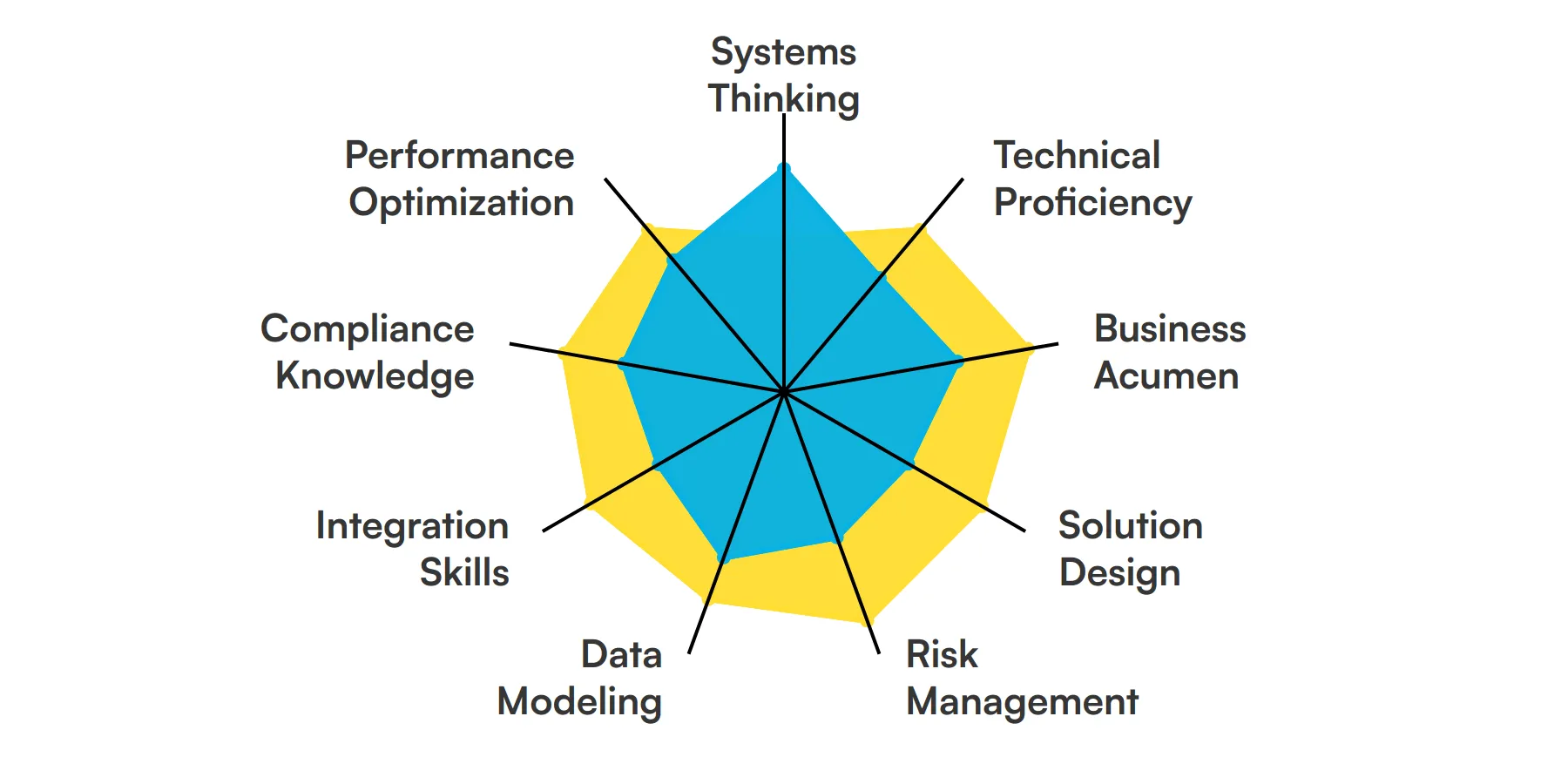
Systems Thinking
Systems thinking allows an enterprise architect to understand and manage the complex interdependencies within an organization. By seeing the big picture, they can design solutions that align with business goals and ensure seamless integration across various systems.
For more insights, check out our guide to writing a System Analyst Job Description.
Technical Proficiency
An enterprise architect must have a deep understanding of various technologies, including cloud computing, databases, and networking. This knowledge enables them to make informed decisions about the best tools and platforms to use for different projects.
Business Acumen
Understanding the business side is crucial for an enterprise architect. They need to align IT strategies with business objectives, ensuring that technology investments deliver real value and support the company's goals.
Check out our guide for a comprehensive list of interview questions.
Solution Design
Solution design involves creating comprehensive plans for IT systems that meet business requirements. An enterprise architect uses this skill to develop scalable, efficient, and secure architectures that address current and future needs.
Risk Management
Risk management is about identifying potential issues and mitigating them before they become problems. An enterprise architect uses this skill to ensure that systems are resilient and can handle unexpected challenges.
For more insights, check out our guide to writing a Risk Analyst Job Description.
Data Modeling
Data modeling involves creating visual representations of data structures. This skill helps an enterprise architect design databases and data flows that support business processes and decision-making.
Integration Skills
Integration skills are essential for connecting disparate systems and ensuring they work together seamlessly. An enterprise architect uses these skills to create cohesive IT environments that enhance productivity and efficiency.
Compliance Knowledge
Understanding regulatory requirements and industry standards is crucial for an enterprise architect. This knowledge ensures that the systems they design are compliant with laws and regulations, reducing the risk of legal issues.
Performance Optimization
Performance optimization involves fine-tuning systems to ensure they operate at peak efficiency. An enterprise architect uses this skill to improve system performance, reduce latency, and enhance user experience.
11 secondary Enterprise Architect skills and traits
The best skills for Enterprise Architects include Project Management, Vendor Management, Cost Management, Security Awareness, Change Management, Documentation Skills, Analytical Thinking, Communication Skills, Collaboration, Problem-Solving and Innovation.
Let’s dive into the details by examining the 11 secondary skills of a Enterprise Architect.
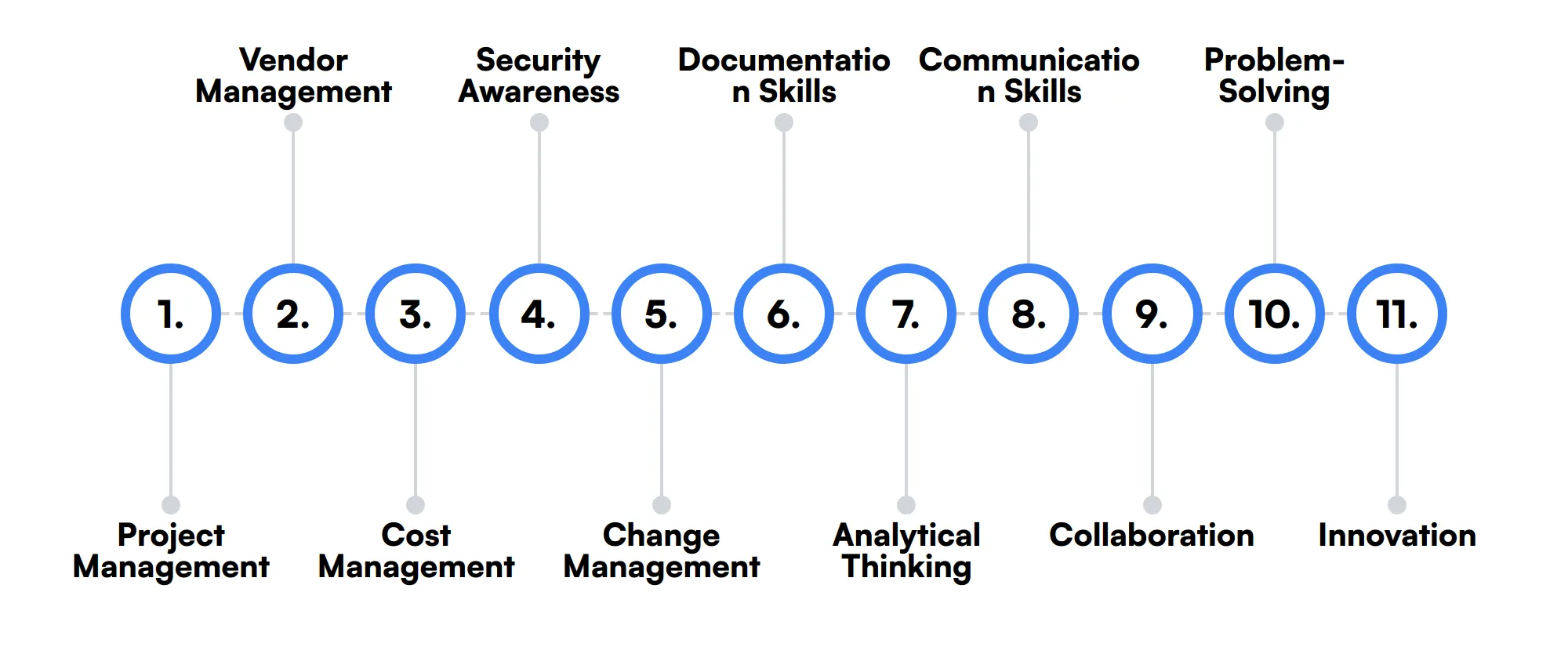
Project Management
Vendor Management
Cost Management
Security Awareness
Change Management
Documentation Skills
Analytical Thinking
Communication Skills
Collaboration
Problem-Solving
Innovation
How to assess Enterprise Architect skills and traits
Assessing the skills and traits of an Enterprise Architect (EA) involves a nuanced understanding of both technical and business domains. EAs are pivotal in bridging the gap between IT and business strategies, ensuring that systems and processes align with the organization's goals.
To accurately gauge an Enterprise Architect's capabilities, one must look beyond their resume to their practical skills in Systems Thinking, Technical Proficiency, and Business Acumen.
Practical assessments are a reliable method to evaluate these skills. For instance, Adaface assessments offer a tailored approach to testing not just the technical knowledge, but also the strategic and analytical prowess of an EA. These assessments help in identifying candidates who are adept at Solution Design, Risk Management, and Performance Optimization, crucial for the role of an Enterprise Architect. Learn more about Adaface assessments here.
By integrating real-world scenarios and problem-solving exercises into the assessment process, organizations can see a candidate's skills in action. This method not only streamlines the hiring process but also ensures a higher quality of hires, reflecting a deep understanding of Integration Skills, Data Modeling, and Compliance Knowledge.
Let’s look at how to assess Enterprise Architect skills with these 6 talent assessments.
Computer Systems Architecture Test
Our Computer Systems Architecture Test evaluates a candidate's grasp of the structural and operational aspects of computer systems, which is fundamental for roles requiring deep technical knowledge in system architecture.
The test assesses understanding in areas such as processor architecture, memory hierarchy, input/output systems, and overall system performance. It also covers essential software engineering principles and data structures.
Candidates who perform well demonstrate a strong ability to design and understand complex computer systems, which is critical for optimizing system performance and ensuring efficient system design.
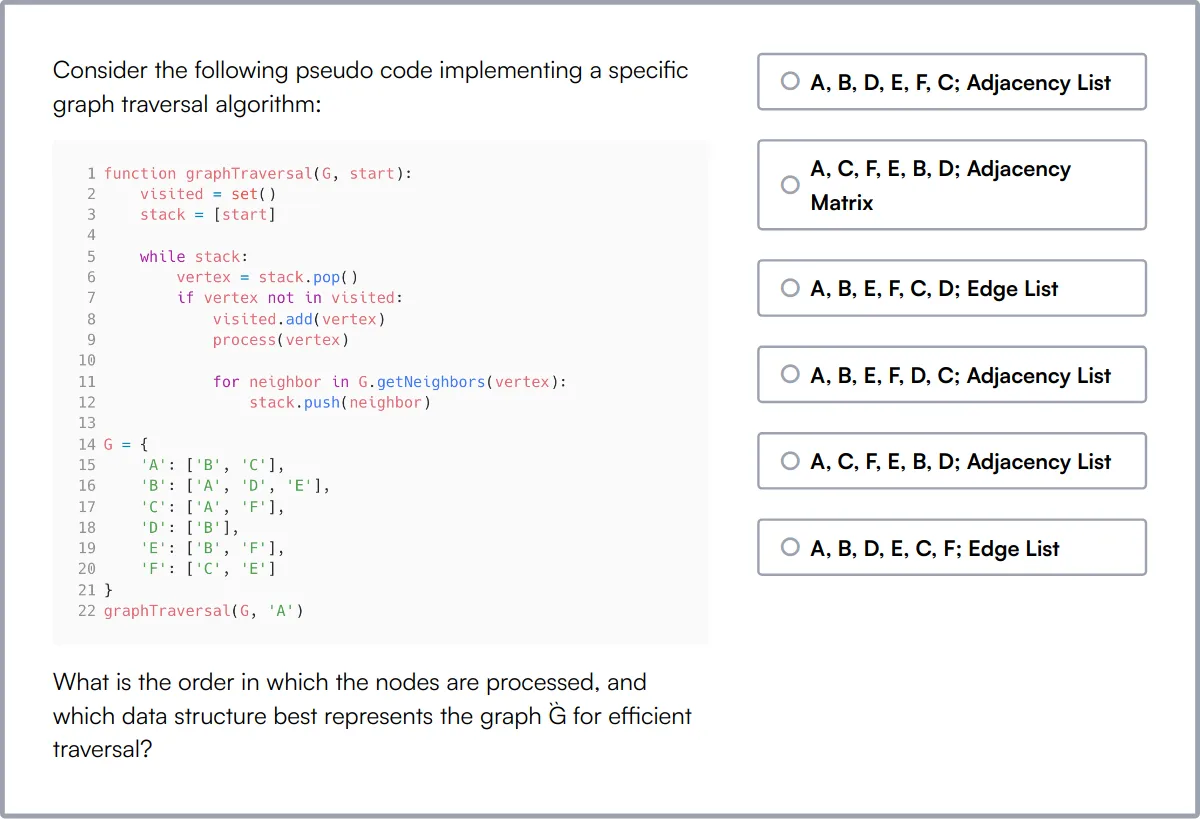
Technical Aptitude Test
Our Technical Aptitude Test measures a candidate's general technical proficiency and problem-solving skills, which are necessary for a variety of technical roles.
This test covers a broad range of topics including programming fundamentals, data structures, database management, and networking and security, assessing the candidate's ability to apply logical reasoning and analytical skills.
High-scoring individuals are likely to have a solid foundation in technical concepts and the ability to tackle complex problems effectively.
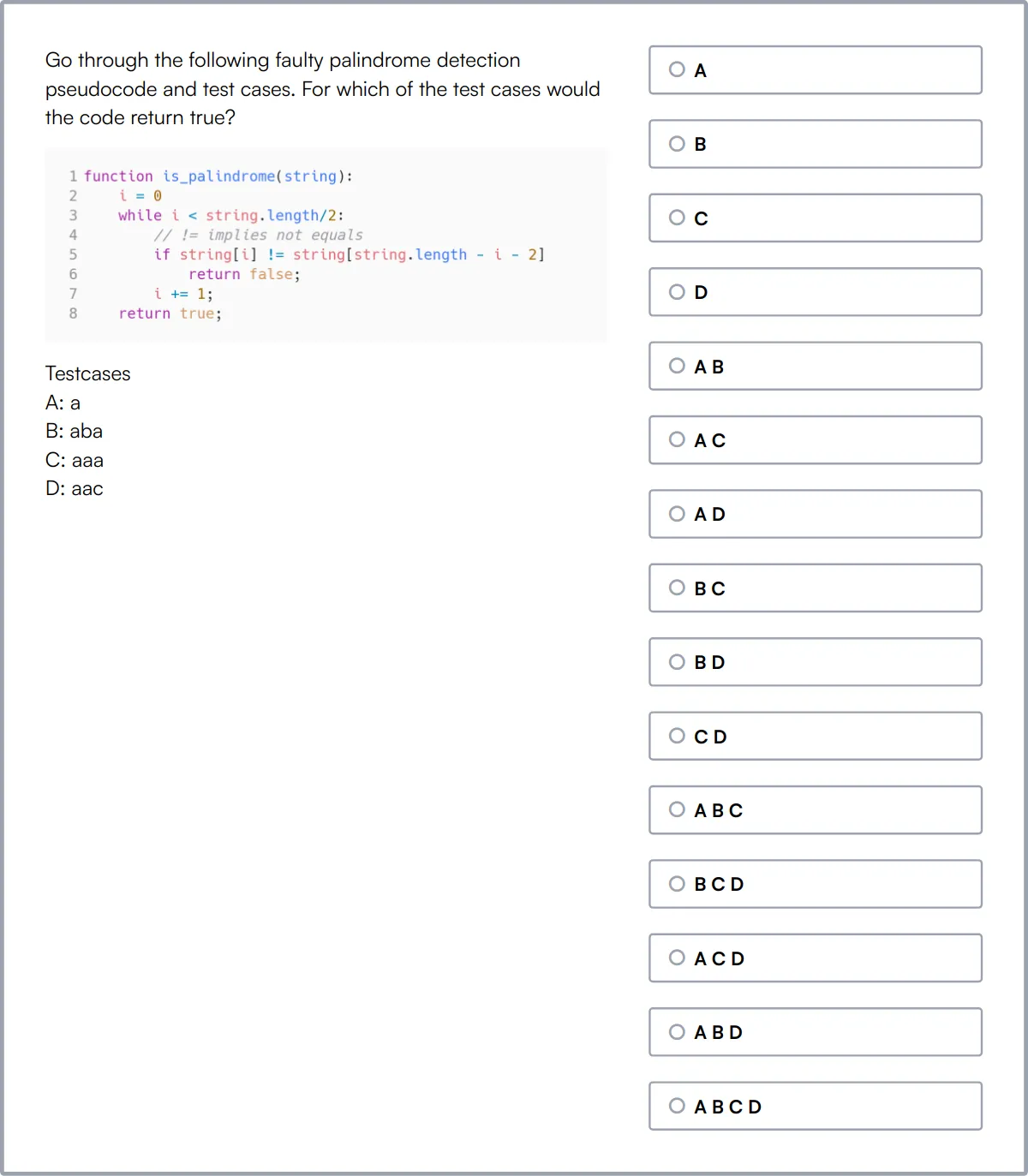
Data Interpretation Assessment Test
Our Data Interpretation Assessment Test focuses on a candidate's ability to analyze and draw insights from complex data sets, a key skill in data-driven decision making.
The test challenges candidates to interpret various data formats such as graphs, charts, and tables, requiring a keen eye for detail and strong analytical skills.
Successful candidates will demonstrate proficiency in extracting meaningful insights from data, which is crucial for strategic decision making in business contexts.
System Design Online Test
Our System Design Online Test assesses a candidate's expertise in creating software systems that meet both functional and non-functional requirements, a key competency in software architecture.
The test evaluates skills in system integration, security, database design, and performance optimization, focusing on the candidate's ability to design scalable and secure systems.
Candidates excelling in this test are adept at identifying system requirements and choosing appropriate architectures, ensuring high-quality system performance and reliability.
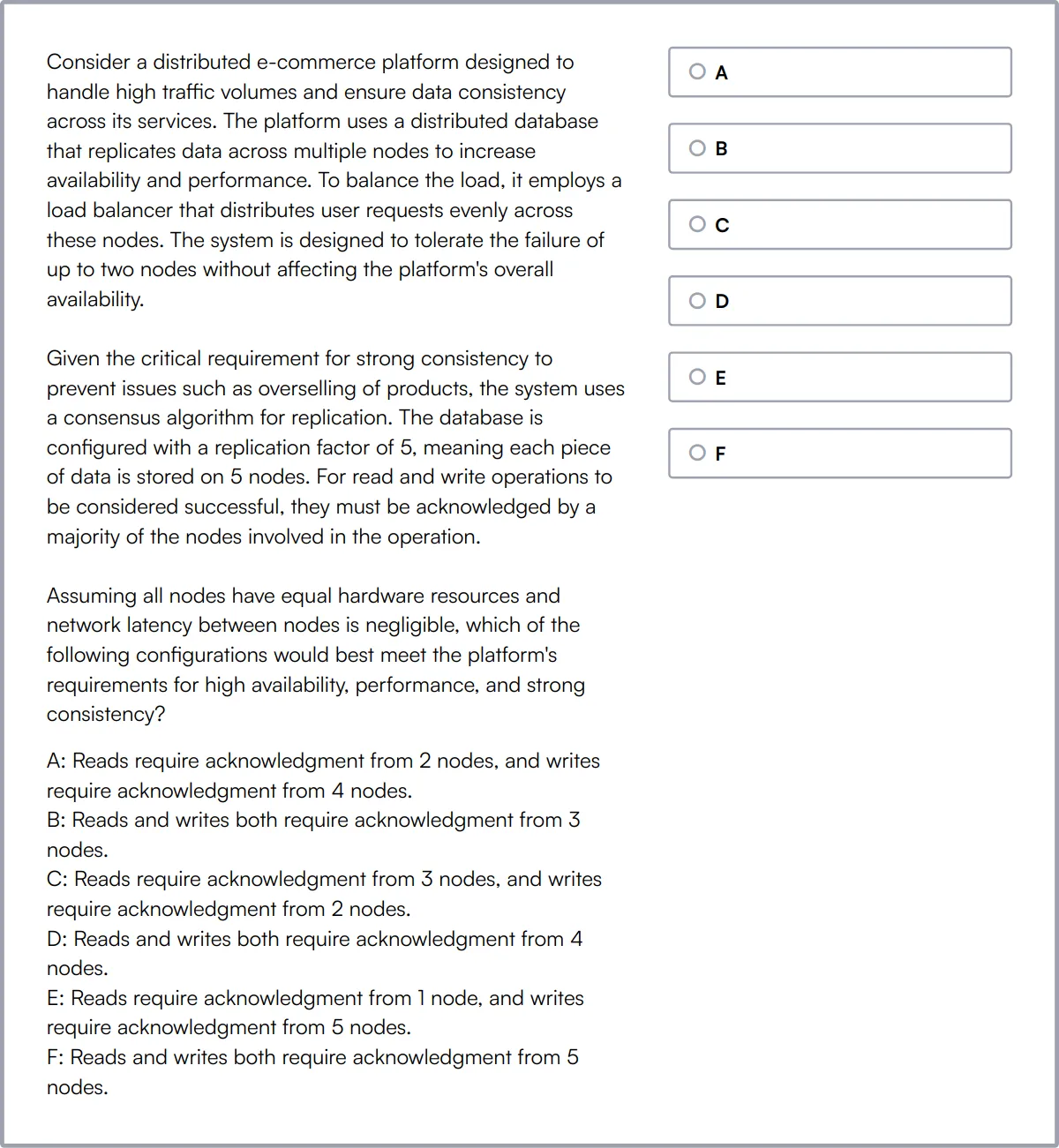
GDPR Online Test
Our GDPR Online Test evaluates a candidate's understanding of the General Data Protection Regulation, assessing their ability to implement and manage compliance measures effectively.
The test covers key areas such as data protection, data security, and consent management, focusing on the candidate's ability to develop GDPR-compliant policies and handle data breaches.
A high score indicates a candidate's proficiency in managing data protection risks and ensuring the privacy and security of personal data.
Data Modeling Skills Test
Our Data Modeling Skills Test measures a candidate's ability in database design and data structuring, which are critical for effective data management and utilization.
The test evaluates knowledge in SQL, ER diagrams, normalization, and relational schema, focusing on the candidate's skills in data integrity and transformation.
Proficient candidates will demonstrate strong capabilities in designing efficient data models and ensuring data accuracy and consistency.
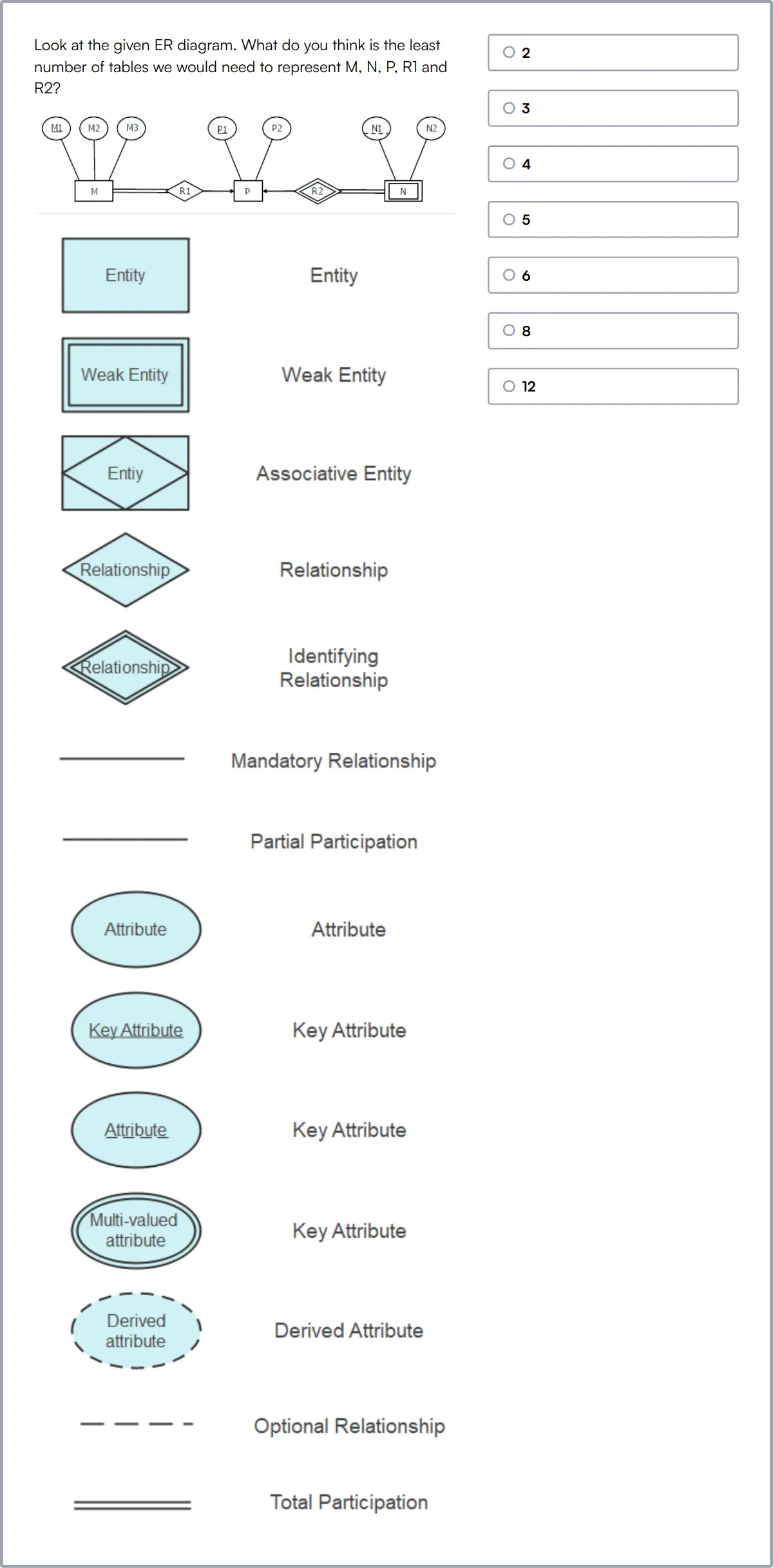
Summary: The 9 key Enterprise Architect skills and how to test for them
| Enterprise Architect skill | How to assess them |
|---|---|
| 1. Systems Thinking | Evaluate ability to understand and manage complex systems holistically. |
| 2. Technical Proficiency | Assess familiarity with relevant technologies and technical skills. |
| 3. Business Acumen | Check understanding of business strategies and market dynamics. |
| 4. Solution Design | Review candidate's approach to crafting effective technical solutions. |
| 5. Risk Management | Determine skill in identifying and mitigating potential risks. |
| 6. Data Modeling | Examine proficiency in creating accurate data representations. |
| 7. Integration Skills | Assess ability to combine multiple systems and technologies smoothly. |
| 8. Compliance Knowledge | Verify understanding of relevant laws and regulations. |
| 9. Performance Optimization | Evaluate techniques used to enhance system efficiency. |
TIBCO Admin Test
Enterprise Architect skills FAQs
What is systems thinking in the context of an Enterprise Architect?
Systems thinking involves understanding and modeling the enterprise as a complex, interconnected system. It helps in identifying how different components interact and impact each other.
How can technical proficiency be assessed for an Enterprise Architect?
Assess technical proficiency through coding tests, technical interviews, and reviewing past projects. Look for experience with relevant technologies and platforms.
Why is business acumen important for an Enterprise Architect?
Business acumen ensures that the architect can align technical solutions with business goals, driving value and supporting strategic objectives.
What are key aspects of solution design in enterprise architecture?
Solution design involves creating scalable, maintainable, and efficient architectures. It includes selecting appropriate technologies and ensuring integration with existing systems.
How do you evaluate risk management skills in an Enterprise Architect?
Evaluate risk management skills by discussing past experiences with risk identification, mitigation strategies, and how they handled unforeseen issues in projects.
What role does data modeling play in enterprise architecture?
Data modeling is crucial for defining data structures, relationships, and storage solutions. It ensures data consistency, integrity, and accessibility across the enterprise.
How important are integration skills for an Enterprise Architect?
Integration skills are essential for ensuring seamless communication between different systems and applications, which is critical for operational efficiency.
What should recruiters look for in terms of security awareness?
Look for knowledge of security best practices, experience with security frameworks, and a proactive approach to identifying and mitigating security risks.
Assess and hire the best Enterprise Architects with Adaface
Assessing and finding the best Enterprise Architect is quick and easy when you use talent assessments. You can check out our product tour, sign up for our free plan to see talent assessments in action or view the demo here:

40 min skill tests.
No trick questions.
Accurate shortlisting.
We make it easy for you to find the best candidates in your pipeline with a 40 min skills test.
Try for freeRelated posts
Free resources



